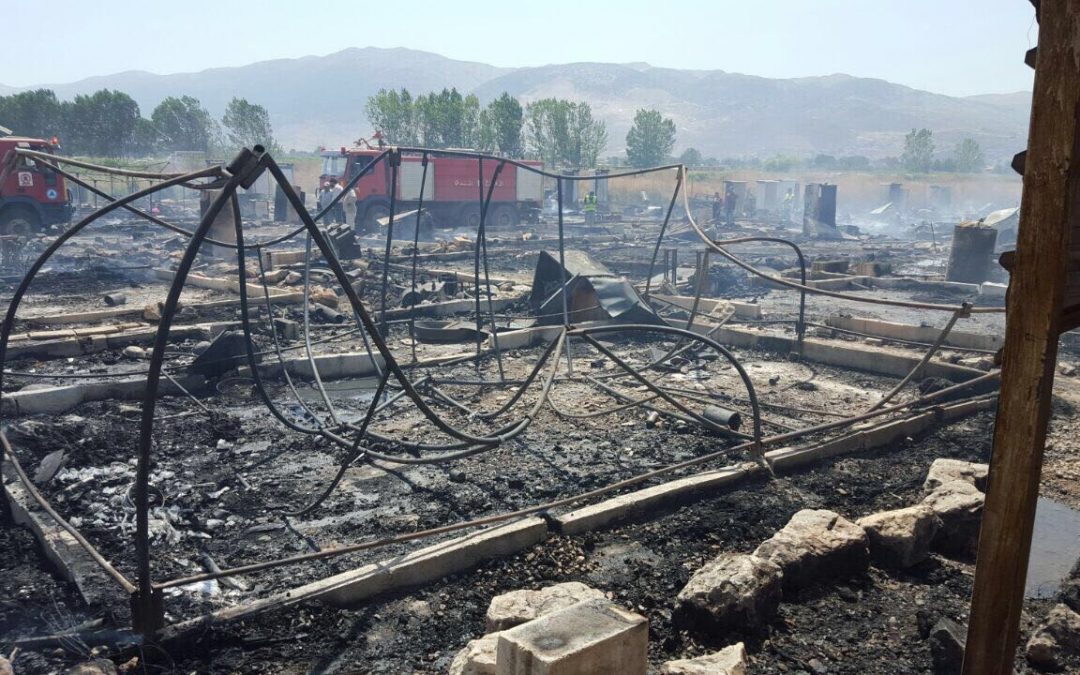Dr Helen Underhill, Global Development Institute, University of Manchester
In July, I accompanied Operation Florian – volunteers from the UK Fire and Rescue Services and affiliated to UK Fire Aid – to Lebanon as part of their humanitarian response in informal settlements. Largely led and supported by Save the Children Lebanon, the trip focused on supporting local NGOs in the design and delivery of fire risk and prevention training to refugee communities living in camps (informal tented settlements – ITS) and substandard buildings (SSB) in the Bekaa Valley. Travelling shortly after the Grenfell Tower fire in London, I was reminded that, even in a country like the UK that has made huge progress in reducing the number of fires, it is the most vulnerable within our communities that still face the greatest risk. The trip with the Operation Florian team demonstrated that the injustices of fire exist in even the smallest communities.
Upon arriving into Zahle, the town in which we would be based, the importance of highlighting fire risk and prevention within communities living in informal settlements became even more stark: whilst transiting the 45km from Beirut, a fire swept through one of the ITS, destroying all 102 tents and killing a two-year-old boy. The following day, a neighbouring ITS suffered a similar tragedy, with a six-year-old girl being killed when a tyre (used to weight the plastic sheeting in place) fell from the roof and trapped her in the burning structure. Having spoken with survivors of the first fire and learning of the importance of creating a fire break, the community leader had been able to limit the second fire’s path and it burnt down just 19 of the 120+ tents. Having already fled war in neighbouring Syria, the refugees in these two settlements face the challenge of, once more, having to build their lives.
Fire and extremes of vulnerability
At the end of June, UNHCR reported having registered 357,303 Syrian refugees in the Bekaa Valley alone. Refugees that can afford to will rent accommodation, most often in substandard buildings (SSB) – unfinished residential blocks or garages. But for many, renting privately is beyond their means and they are settled in one of the Informal Tented Settlements (ITS). Comprising largely wooden structures covered with plastic sheeting and measuring around 8-10m x 6-8m, each ‘tent’ houses around seven or eight people and functions as living area, kitchen and bedroom.
Through observations in various Save the Children Lebanon sites, we gathered more information about the daily practices in ITS and SSB that increase fire risk and learned quickly that it is women and children who are particularly vulnerable. Daily activities such as making tea are particularly hazardous as gas stoves and fuel are used and stored inside structures that are easily ignited or could spark and start a fire. For example, in one SSB we visited, a large fuel tank close to unsafe electric cables was stored on the stairs, the only means of escape for everyone living in the block. Perhaps illustrating a more obvious hazard, while we talked with a group of women, the kettle was boiled on an exposed flame inside one of the tents just centimetres from fabric that fluttered in the breeze and from a child who was inquisitive about what his young mother was doing.
Gender inequalities and the compounding of fire vulnerability
Social and cultural norms arguably make women and children more vulnerable to the effects of fire because of the way in which they shape roles and behaviours. In an informal settlement, these norms can have tragic consequences. For instance, one of the recent ITS fires broke during the night. A mother delayed carrying her six children from the burning tent because she needed to ensure ‘appropriate’ head-covering before she could be in public view. Sadly, fire spreads rapidly and the delay meant that one of the woman’s daughters became trapped in the tent before the mother could return to save her.
The conversations with women I spoke to during my time in Lebanon prompted many questions, including how to change the relationship between societal norms and fire vulnerability. It appeared that, on the whole, men receive more fire education than women and children, perhaps because training has focused on using ’hard components’ such as fire extinguishers. Indeed, one woman suggested that the community leader decides what they [the women] need to know. This approach to fire education underestimates the daily fire risks experienced by women who are responsible for cooking, particularly when men often leave the site for a full day as they search for work. Indeed, in one ITS we visited, it was reported that there had been days where only children were present, a huge risk had a fire broken out. It seems that men have been established within the community as knowledge brokers, determining what information should be shared.
Adopting a gendered perspective throughout this trip, I concluded that an on-going challenge for NGO staff working in ITS and SSBs across Lebanon is not just ensuring that refugee communities receive information but to keep reflecting on who within each community is targeted for what knowledge and skills and why. Just as we in the UK cannot be complacent about the risk of fire, NGOs in the humanitarian sector cannot be complacent by assuming that educational interventions will result in critical information being shared among all members of a community. Gender inequalities place women and children at greater fire risk through their daily activities. It is important to recognise, however, that these risks are exacerbated by social norms that limit access to knowledge and skills that can, ultimately, save lives of an already vulnerable population.



